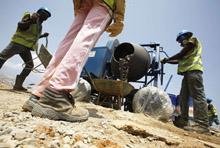
Typical street scene in Santa Ana, El Salvador. (Photo: iStock)
IMF Survey : New Financing Could Test West Africa’s Regulation, Supervision
October 31, 2013
- Reversal of international capital flows may limit state infrastructure financing
- Therefore development of new sources of infrastructure financing is critical
- Conference reviewed progress made in regional financial integration
As West Africa seeks to mobilize new sources of financing, particularly for infrastructure, policymakers will have to address a host of cross-border regulatory and supervisory issues, a Ghana conference hears.

Bridge builders in Abidjan, Cote d’Ivoire: West Africa wants new financing, sources, particularly for infrastructure (photo: Thierry Gouegnon/Reuters/Newscom)
WEST AFRICAN FINANCIAL INTEGRATION
Finance ministers, central bank governors, and other senior officials from West Africa gathered in Accra, Ghana, this week to review progress made in regional financial integration and get a glimpse of what their future could have in store.
Conference delegates met to discuss financial sector integration under the auspices of the IMF and the government of Ghana, who co-hosted the conference for the Economic Community of West African States (ECOWAS).
The one-day event, focusing on the Opportunities and Challenges of Financial Sector Integration in West Africa, examined in detail many of the issues that this rapidly developing region faces and included in their discussions the emergence of financial institutions now widely known as pan-African banks.
Lessons from other regions
Speaking at the opening of the conference, Ghanaian Vice President Kwesi Amissah-Arthur said that “the development of sources of infrastructure financing is critical at a time when a reversal of (international) capital flows may constrain the capacity of governments to financing infrastructure needs.” He called on the conference to draw lessons from other regions that have mitigated risks associated with financial sector integration.
IMF Deputy Managing Director Naoyuki Shinohara said that the conference reached important conclusions that will have to be taken forward by the participating governments. “International experience tells us that more complex financial systems require more sophisticated supervision to maintain financial stability,” he said. “Countries in West Africa are now host and home to financial institutions that can only be supervised effectively if countries cooperate closely in all aspects of supervision.”
Attract private sector
Shinohara also highlighted the importance of financial sector development in creating a business and regulatory environment that attracts private sector investment. IMF officials underlined the importance of the institution’s technical assistance in this area, drawing upon the experience of other regions.
Also participating from the IMF were Antoinette Sayeh, Director of the IMF African Department, and José Viñals, Financial Counselor and Director of the Monetary and Capital Markets Department, whose departments have been deeply involved in the provision of technical assistance and training in regions of Africa that already have advanced the process of financial integration.
To support this capacity development effort, the IMF will open a new technical assistance center based in Accra in early 2014 that will assist six of the ECOWAS countries. A center based in Cote d’Ivoire already supports other countries from the grouping.
African officials highlighted the importance of cooperation in developing regional integration. “The issues discussed at the conference clearly show that we have some way to go to deepen that cooperation,” including information sharing and bank resolution, said Ghana’s Central Bank Governor, Kofi Wampah, at a closing press conference.


